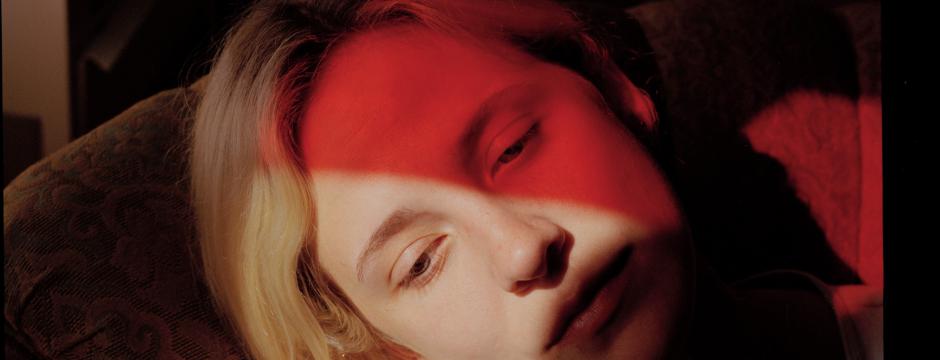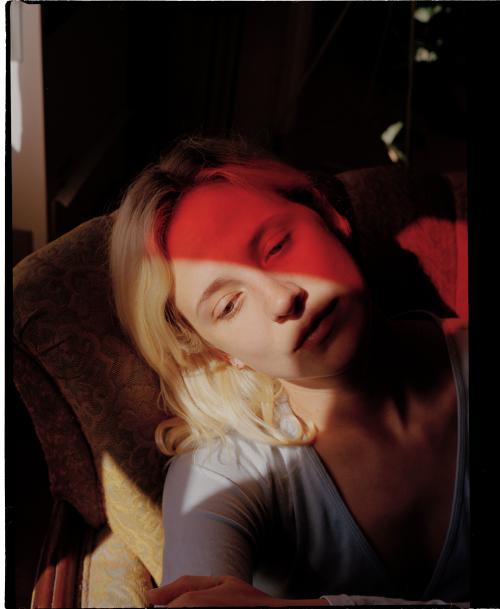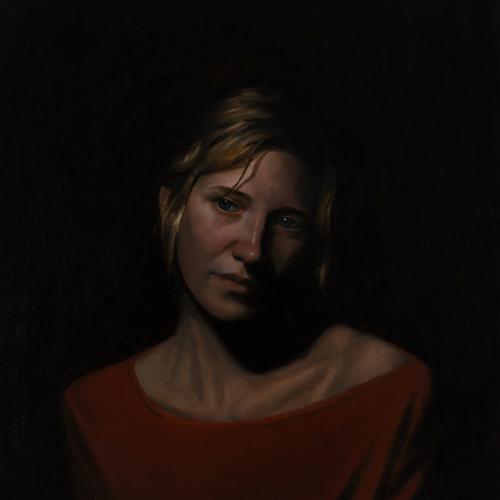Band: Helena Deland
Album: Someone New
VÖ: 16.10.2020
Label: Luminelle Recordings / Fat Possum / Membran
Website: https://www.helenadeland.com/
A unique transformation occurs the moment a lover lays eyes on your bedroom for the first time: the room is suddenly, involuntarily no longer your own. Your curated “you” is subject to the impressions of the other, and you try hard to adopt this filter yourself, wondering what information the objects and their position suggest about you. If, in moments like these, the new gaze seems to almost conjure the room, a desperate question arises: what remains of the room without the other? With no external sources of appraisal or affirmation, where does the stuff of the self reside, and how does it take shape?
These blood-deep paranoias set the stage for Helena Deland’s debut album, Someone New, an exploration of gender, power, time and the “self” that finds Deland in full control of her sound and style, even as she asks whether control is ever possible. The album was written and recorded over a period of two years, beginning with Deland’s guitar and expanding into a lavish sonic sphere that blends elements of hypnagogic pop and classic folk. Deland’s voice ties it all together, sometimes hushed in a whisper, sometimes shrouded in distortion, and sometimes full and clear – but always inviting the listener into her world.
The writing process was slow and deliberate. Following the release of her 2018 collection of songs, Altogether Unaccompanied,Deland found herself lacking a sense of who she was and longing to feel defined. She reflects on how gender dynamics affect her both personally and professionally. “In and outside of my music career”, she explains, “relying on the gaze of someone else for validation and a sense of my own worth alienated me from myself and made it very difficult for me to make anything.” She was caught in fears of getting older, of having missed out on life while waiting for it to start. Deland returned to the intimate bedroom-scape as a fortress from which to work towards self-recovery and to reclaim the process of album-making. “I had to take some time to reflect on that and to let myself write some tunes that were soft pockets of myself outside of myself. The songs allowed me to feel freed at least partially from insecurities the patriarchal gaze brings forth by identifying them and situating myself in relation to it.”
When she was ready to emerge from the solitary part of the work, she brought the songs to long-time friend Valentin Ignat to flesh out the arrangements. They recorded at a Montréal studio with her band before Deland took the album to New York for additional production and mixing with friend and collaborator Gabe Wax. “Once it came time to record,” Deland says, “I wanted every song to convey its least self-conscious form, but I was already feeling some distance between where I was then and the place from which I’d written the songs. The intention was to make something alive and open, true to both spaces (the one from which I’d written and the one in which we recorded), with its feet in reality but its head in some more playful, evocative space.”
What emerges is an album that feels both grounded and whimsical, narrative and impressionistic, and always open to possibility. Each song is carefully crafted, each arrangement artfully developed to create a self-contained world where reality and imagination coexist. Unsettled synths and dissonant strings tease out the natural darkness in Deland’s melodies; whatever her lyrics leave out, the intricate guitar work and gauzy production fill in. If Altogether Unaccompanied stitched together the fabric of different compositions, Someone New arrives as a fully conceived whole.
The album opens with just Deland’s voice over a low drone: “If I could have every thought / as though for the first time / I’d never get sick of patterns of my mind / but I’m stuck, I am stuck.” Her voice is strong and confident, but the lyrics betray an insecurity – here, Deland observes that the “self” often feels like nothing more than a sort of claustrophobic space carved out by others’ appraisal. She leads the listener into a room from which she calmly states “I am stuck ‘til I get a hold of / a stranger to remind me I don’t contain the world / it is outside can’t I see, and in it I’m this lucky girl / and how to play my role ‘til I get too old.”
While “Someone New” ambivalently celebrates and condemns the idea of being in one’s ‘prime’, as it is so rare that youth and self-knowledge are simultaneous, “Smoking at the Gas Station” is an anxious plea for answers in an scarcity of real connection, asking how a person should be, and whether there comes a moment in one’s life when nothing is experienced as new anymore. “Do I have to mourn everything that’s unfamiliar?”, she asks over and over while the instrumentation crystallizes in expanding loops.
Success and visibility for women in music is too often predicated on the arbitrary possession of youth and beauty. On “Fruit Pit,” Deland expresses a wish to be invisible, to stop the body from giving away more information than intangible parts of the self do. On “Pale,” the shallow binary of lover and mother often affixed to women in heterosexual relationships leaves Deland feeling unsubstantial, barely there. “Spending this much time in my naked body’s / not making it familiar to me,” Deland sings in a playful chant contrasted by menacing bass, the whole coming across as almost mischievous. The song builds to a chorus that is equal parts hard-hitting and washed out, asserting presence and absence at the same time.
Deland’s antidotes to estrangement come in the form of meaningful friendships, as chronicled on propulsive tracks like “Truth Nugget” and “Lylz” (arranged and recorded during a session with Jake Portrait), where bass and percussion lock into tight grooves that drive Deland forward. This theme reaches its apex on the contemplative “Clown Neutral,” which finds Deland tender and honest, supported by a bed of her own vocals, asserting the validity of all experiences: “Neither bad nor good / don’t ask yourself too long how you should / feel, you can feel anything.”
Ultimately, Deland realizes through song writing the impossibility of feeling fully adequate (and its undesirability), and works to come to terms with the self as-is – unveiling those parts of her that were already new. Album closer “Fill the Rooms” brings us back to Deland’s isolated voice, this time over just guitar, and to a familiar backdrop not unlike the one painted by album opener “Someone New”. Whether the request is directed at herself or at someone else is unclear: “Fill the empty rooms with music”, she sings. Before the song disintegrates into silence, a muffled piano and drum loop fade out over the last fifteen seconds of the album, and the plea is quietly but certainly answered.
Someone Newis Montreal's Helena Deland's first full length record. It follows her 2018 series of EPs entitled Altogether Unaccompanied, a two-year period during which she toured with Weyes Blood and Connan Mockasin, amongst others, opened for Iggy Pop in Paris and collaborated with Jpegmafia.


